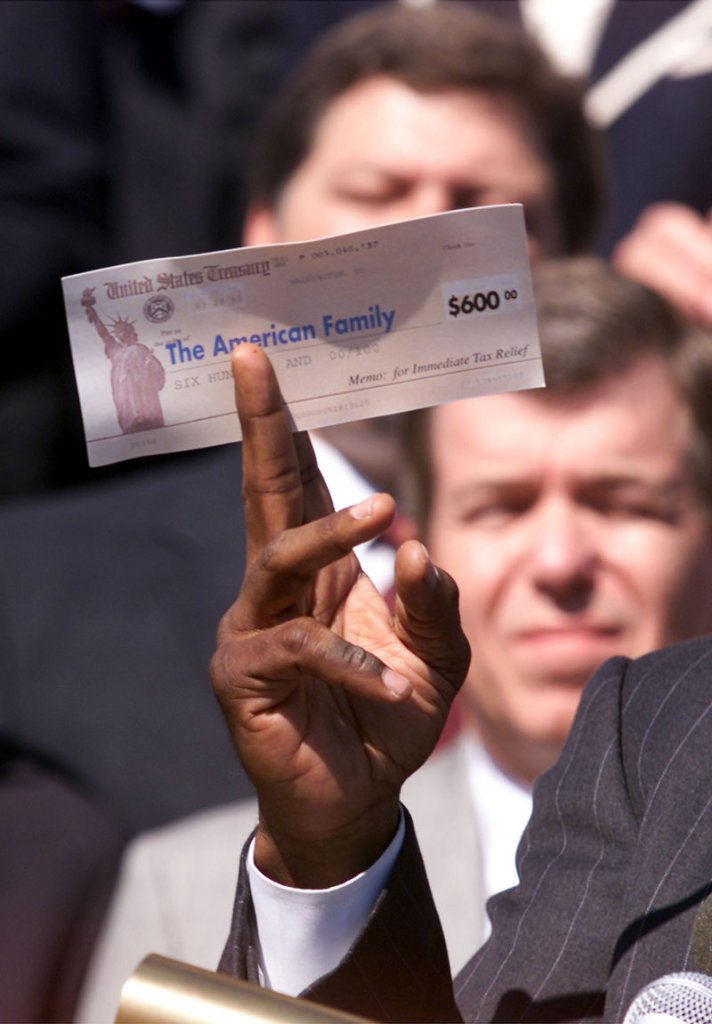WASHINGTON – The tax-refund loan, once a profit source for banks and tax-preparation companies, is vanishing under pressure from federal bank regulators and consumer advocates. But tax filers’ need for quick cash hasn’t eroded, and the companies are looking for ways to capitalize on that market.
Companies including H&R Block Inc., the nation’s largest tax-preparation chain, are turning to so-called refund-anticipation checks, which let taxpayers without bank accounts take advantage of the speed of directly deposited tax refunds through an account established for the payment.
“There’s always going to be demand, and I believe someone’s going to come up with a product,” said John Hewitt, the president, CEO and chairman of Liberty Tax Service Inc., a Virginia Beach, Va.-based tax-preparation company.
Liberty will offer loans to tax filers in at least six states with consumer-finance laws that allow it.
The shift away from tax-refund loans has occurred over the past few years. The Internal Revenue Service stopped telling tax preparers and banks whether refunds would be siphoned off to cover other debts. Bank regulators at the Federal Deposit Insurance Corp. and the Office of the Comptroller of the Currency questioned whether refund loans were a safe product for banks and whether they adequately protected consumers.
The shrinking of the refund-loan industry culminated Dec. 8 when Republic Bancorp Inc., the last bank company to finance refund loans, announced a settlement agreement with the FDIC. London-based HSBC Holdings and New York-based JPMorgan Chase & Co. had previously exited the business.
Under the settlement, Republic agreed to stop providing refund-anticipation loans after the 2012 tax season, pay a $900,000 penalty, drop litigation against the FDIC and submit to supervision of its tax-refund business.
Republic, which provides loans for Jackson Hewitt Tax Service Inc. and Liberty Tax, in 2010 earned $44.2 million, or 69 percent of its net income, from its tax business.
“With this settlement, we preserve a big chunk of this business going forward,” said Steve Trager, chairman and CEO of Louisville, Ky.-based Republic.
The company charged $90 for a $1,500 loan and $30 for a refund-anticipation check, which is less risky for the bank. With a loan, tax filers receive the money up front and then repay it when their tax refunds arrive, often within two weeks.
With a refund-anticipation check, taxpayers don’t receive any money until the IRS issues the refund. Tax filers get their money faster than if they wait for a paper check from the IRS.
Last year, Trager said, Republic issued loans and other tax-related products, including refund-anticipation checks, known as RACs, for 3.5 million people.
Trager said he expects continued growth in the bank’s tax business outside of loans.
“A lot of regulations apply to loans that don’t apply to non-loans,” Trager said. “Even though I disagree with anyone that says $90 is too much for the loan product, our adversaries had a lot of weapons when it comes to loans because there’s a lot of regulation that relate to loans.”
Consumer advocates have long maintained that refund-anticipation loans prey on workers applying for the earned income tax credit who are among the almost half of U.S. households that don’t pay income taxes.
“These are low-income families with a lot of expenses, and this is the one time of year that they see a significant chunk of money,” said Chi Chi Wu, a staff attorney at the National Consumer Law Center. “The sharks come circling, and all the industries that want a piece of that money come in.”
Wu said payday lenders and other companies may fill the void left by the end of refund-anticipation loans, known as RALs.
“While RALs made by banks are gone, tax-time financial products aren’t gone,” she said, adding that her group is examining refund-anticipation checks and urging states to regulate them.
H&R Block isn’t offering refund loans this year. Gene King, a company spokesman, declined to comment for this story.
Phil Mazzini, who runs the company’s retail tax business, told investors at a conference in New York on Dec. 8 that Block’s competitive disadvantage didn’t hurt the company in 2011.
“Independents lost share for the first time in at least five years, as they lack the scale and the tools to combat the RAL loss,” Mazzini said.
The “low-cost, no-cash-out-of-pocket RAC benefit is the key settlement product benefit, and that the higher-cost, faster-access-to-a-refund RAL benefit has become a distant second, especially given the shrinking IRS refund window,” he said.Consumer advocates maintain that refund-anticipation loans prey on workers applying for the earned income tax credit.
Send questions/comments to the editors.



Success. Please wait for the page to reload. If the page does not reload within 5 seconds, please refresh the page.
Enter your email and password to access comments.
Hi, to comment on stories you must . This profile is in addition to your subscription and website login.
Already have a commenting profile? .
Invalid username/password.
Please check your email to confirm and complete your registration.
Only subscribers are eligible to post comments. Please subscribe or login first for digital access. Here’s why.
Use the form below to reset your password. When you've submitted your account email, we will send an email with a reset code.